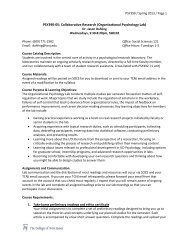MACHIAVellIAnIsM, UnetHICAl BeHAVIoR, AnD Well-BeIng In ...
MACHIAVellIAnIsM, UnetHICAl BeHAVIoR, AnD Well-BeIng In ...
MACHIAVellIAnIsM, UnetHICAl BeHAVIoR, AnD Well-BeIng In ...
Create successful ePaper yourself
Turn your PDF publications into a flip-book with our unique Google optimized e-Paper software.
190 DAHLING, KUyUMCU, AND LIBRIzzI<br />
Restubog, Scott, and zagenczyk (2011) found an increase in supervisor-directed deviance among<br />
individuals who had experienced abusive supervision. Reductions in job performance and increases<br />
in workplace strife can have serious consequences for the prosperous operation and financial success<br />
of the organization. <strong>In</strong> summary, the available evidence suggests that the aggregate result of<br />
Machiavellian unethical behavior unfolding in dyadic relationships and work groups may be the<br />
compromised well-being and performance of the entire organization.<br />
FUtURe ReseARCH DIReCtIons on <strong>MACHIAVellIAnIsM</strong> <strong>AnD</strong><br />
<strong>Well</strong>-<strong>Be<strong>In</strong>g</strong><br />
Although an impressive body of evidence has documented the detrimental effects of Machiavellian<br />
unethical behaviors on well-being, additional research is needed to clarify several issues. Most<br />
important, future research should expand beyond a focus on either Machiavellian individuals or<br />
dyadic relationships to explore how Machiavellianism impacts the broader social network and<br />
organizational performance criteria. Most research to date has drawn inferences about how Machiavellian<br />
behavior might poison the broader organization, but evidence of these consequences<br />
is limited.<br />
Social network analysis (Borgatti and Foster, 2003) offers a particularly fruitful approach for<br />
answering these questions. Social network analysis involves mapping the social relationships between<br />
people in an identifiable organization to examine how tangible and social assets (knowledge,<br />
trust, liking, etc.) are shared. <strong>In</strong> a social network, individual power is a consequence of having<br />
many connections in a relatively sparse network full of structural holes. <strong>In</strong> such a context, powerful<br />
people have access to resources and are able to broker relationships between other people who<br />
would otherwise be unconnected. We expect that Machiavellians seek to find and occupy these<br />
strategic positions that bridge structural holes to keep themselves well-informed and important in<br />
the social network. This idea is broadly consistent with some findings that show that Machiavellianism<br />
only contributes to performance as tenure increases, which suggests that Machiavellian<br />
employees need time to strategically embed themselves in the social network of an organization<br />
before they can capitalize on their motivations and become successful (Dahling, Whitaker,<br />
and Levy, 2009). Notably, such an arrangement is detrimental to the overall health of the social<br />
network, as denser networks with fewer structural holes allow for a freer exchange of resources<br />
and information where they are needed to enhance organizational productivity. Future research<br />
on social networks could compellingly demonstrate how Machiavellian employees threaten the<br />
organization by perpetuating ineffective social arrangements that best serve themselves.<br />
Another important direction for future research concerns the Machiavellianism exhibited by<br />
top leaders who are in key positions to impact organizational success. The limited research on<br />
Machiavellian leaders has presented mixed evidence about when Machiavellian leadership will<br />
detract from organizational well-being. For example, Deluga (2001) found that Machiavellianism<br />
(as inferred from historical profiles) was positively related to ratings of charisma and performance<br />
among all past American presidents. Evidence from lab studies also suggests that Machiavellian<br />
leaders can be highly adaptive in uncertain contexts and that they adopt a task-oriented style to<br />
help clarify objectives. However, Machiavellian leaders also tend to be very inconsiderate of followers,<br />
ineffective when resolving group conflicts, and easily frustrated when faced with tasks that<br />
are unfavorable or difficult (Drory and G>). Despite these important preliminary findings, little<br />
is known about Machiavellianism and its effects among real business leaders, which is a critical<br />
shortcoming of the literature. Future research should focus on how leader Machiavellianism<br />
impacts both internal and external organizational criteria, such as the development of an ethical








